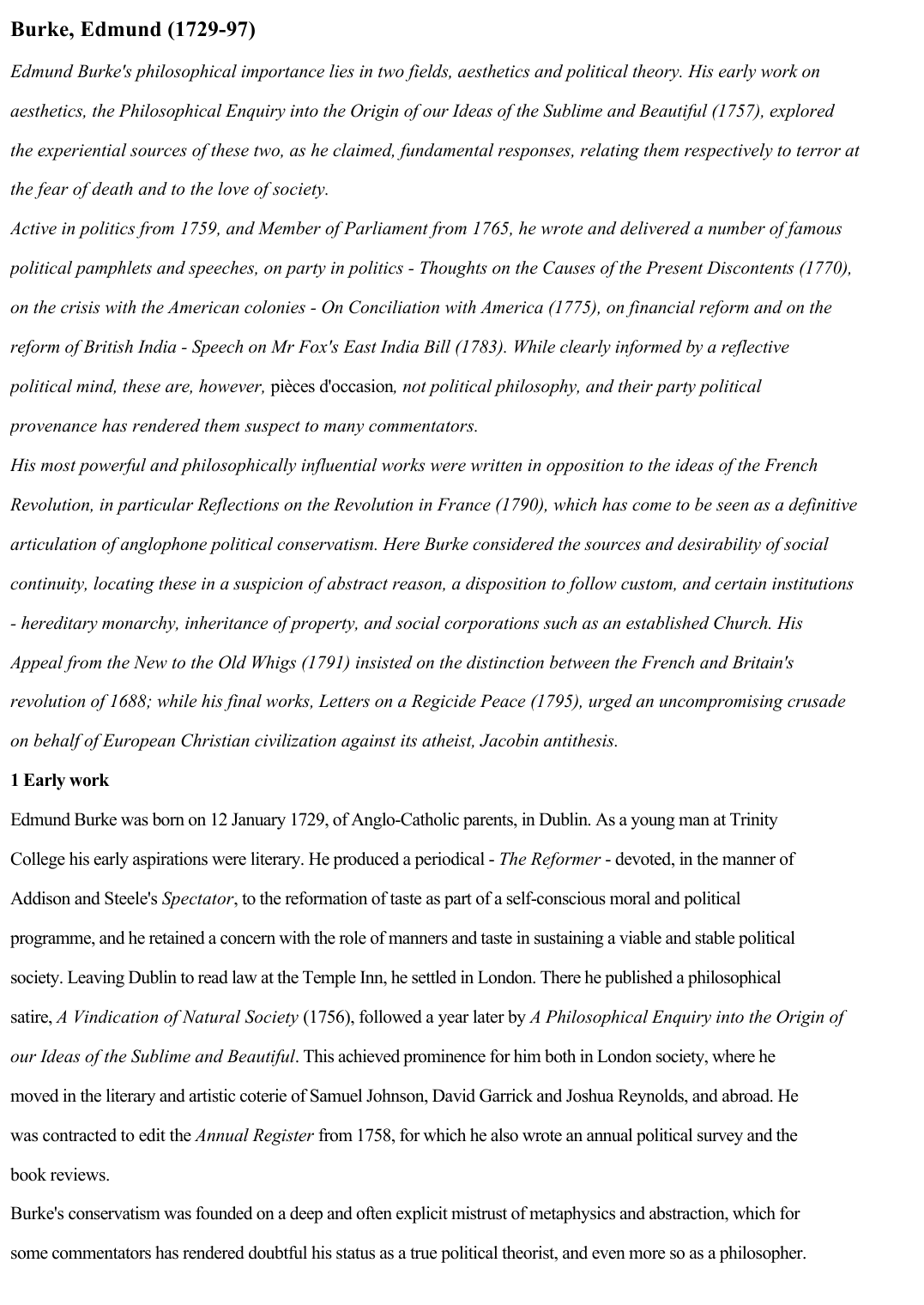Burke, Edmund
Publié le 16/05/2020
Extrait du document
«
Burke, Edmund (1729-97)
Edmund Burke's philosophical importance lies in two fields, aesthetics and political theory.
His early work on
aesthetics, the Philosophical Enquiry into the Origin of our Ideas of the Sublime and Beautiful (1757), explored
the experiential sources of these two, as he claimed, fundamental responses, relating them respectively to terror at
the fear of death and to the love of society.
Active in politics from 1759, and Member of Parliament from 1765, he wrote and delivered a number of famous
political pamphlets and speeches, on party in politics - Thoughts on the Causes of the Present Discontents (1770),
on the crisis with the American colonies - On Conciliation with America (1775), on financial reform and on the
reform of British India - Speech on Mr Fox's East India Bill (1783).
While clearly informed by a reflective
political mind, these are, however, pièces d'occasion , not political philosophy, and their party political
provenance has rendered them suspect to many commentators.
His most powerful and philosophically influential works were written in opposition to the ideas of the French
Revolution, in particular Reflections on the Revolution in France (1790), which has come to be seen as a definitive
articulation of anglophone political conservatism.
Here Burke considered the sources and desirability of social
continuity, locating these in a suspicion of abstract reason, a disposition to follow custom, and certain institutions
- hereditary monarchy, inheritance of property, and social corporations such as an established Church.
His
Appeal from the New to the Old Whigs (1791) insisted on the distinction between the French and Britain's
revolution of 1688; while his final works, Letters on a Regicide Peace (1795), urged an uncompromising crusade
on behalf of European Christian civilization against its atheist, Jacobin antithesis.
1 Early work
Edmund Burke was born on 12 January 1729, of Anglo-Catholic parents, in Dublin.
As a young man at Trinity
College his early aspirations were literary.
He produced a periodical - The Reformer - devoted, in the manner of
Addison and Steele's Spectator , to the reformation of taste as part of a self-conscious moral and political
programme, and he retained a concern with the role of manners and taste in sustaining a viable and stable political
society.
Leaving Dublin to read law at the Temple Inn, he settled in London.
There he published a philosophical
satire, A Vindication of Natural Society (1756), followed a year later by A Philosophical Enquiry into the Origin of
our Ideas of the Sublime and Beautiful .
This achieved prominence for him both in London society, where he
moved in the literary and artistic coterie of Samuel Johnson, David Garrick and Joshua Reynolds, and abroad.
He
was contracted to edit the Annual Register from 1758, for which he also wrote an annual political survey and the
book reviews.
Burke's conservatism was founded on a deep and often explicit mistrust of metaphysics and abstraction, which for
some commentators has rendered doubtful his status as a true political theorist, and even more so as a philosopher..
»
↓↓↓ APERÇU DU DOCUMENT ↓↓↓
Liens utiles
- Edmund Burke, « Première lettre sur les ouvertures de paix » (1796)
- Edmund Burke, Speech on Conciliation with the Colonies, 22 March 1775
- HUSSERL, EDMUND
- Edmund Burke1729-1797Entré au Parlement en 1765 et membre de l'opposition whig, c'est le plus grand pamphlétaireet l'un des plus grands orateurs politiques de l'Angleterre.
- Edmund Wilson1895-1972Né à Red Bank (New Jersey), mort dans l'État de New York.

































